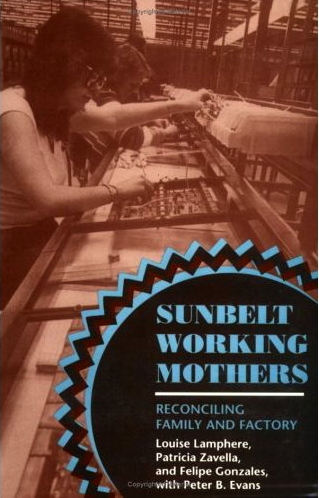Sunbelt Working Mothers: Reconciling Family and Factory
The recession of the 1980s triggered important economic and cultural changes in the United States, and working women were at the center of these changes. Sunbelt Working Mothers compares the experiences of Mexican-American and white mothers employed in apparel and electronics factories in Albuquerque and illuminates the ways in which individual women manage the competing demands of two roles. Authors Lamphere, Zavella, Gonzales, and Evans show how these mothers – without the economic resources of highly paid professional women – find day care, divide economic contributions and household responsibilities with spouses or roommates, and obtain emotional support from kin or friends.
After and overview of the recent industrialization of the Sunbelt economy, the authors consider how new participative management techniques have given greater flexibility to some women’s work lives. Drawing on in-depth interviews with married couples and single mothers, they offer an engaging account of representative women’s home lives and conclude that working families are changing. Working-class women are more committed to full-time work than their mothers were, while their spouses are doing more housework and providing more childcare. Despite ethnic differences, many Hispano and Anglo mothers show strong similarities in their responses to employers’ policies, as well as their negotiations with husbands concerning childcare and housework.
Documenting the diversity and flexibility of working families today, this timely book will be welcomed by students and scholars in the fields of anthropology, sociology, labor studies, women’s studies, and social history.
